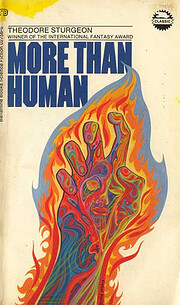

Click on a thumbnail to go to Google Books.
|
Loading... More Than Human (original 1953; edition 2013)by Theodore Sturgeon (Author)
Work InformationMore Than Human by Theodore Sturgeon (1953)

» 12 more 501 Must-Read Books (294) Books Read in 2017 (3,238) SF Masterworks (63) Books Read in 2023 (4,756) The 5 Parsec Shelf (16) Otherland Book Club (13) No current Talk conversations about this book. Story: 3 / 10 Characters: 9 Setting: 5 Prose: 7 I've decided to start breaking down my ratings better. Generally, story is the only element that matters, since literature is a storytelling medium. Thus, my regular rating focuses only on that. You can easily see from the rating breakdown that besides the story, this book was generally quite strong. A similar idea to the wolves in Vinge's Zones of Thought trilogy. Nevertheless, not recommended. A new species comes into existence, Homo Gestalt. This struck enough chords for me to recognise that I probably read it about 40 - 50 years ago at a time when I was reading a lot of SF with similar themes. This time round though, my head being in a different place, I struggled with it and just found it baffling for much of it. It wasn't bad, but I had no particular impulse to pick it up again after doing other things and was forcing myself to finish it just to get it out of the way. no reviews | add a review
Belongs to Publisher SeriesIs contained inHas the adaptationAwardsDistinctionsNotable Lists
Six misfits, one powerful entity. An award-winning novel about belonging by "one of the greatest writers of science fiction and fantasy who ever lived" (Stephen King). Individually, they are a seemingly simpleminded young man living in the woods who can read the thoughts of others, a runaway girl with telekinetic powers, twin girls who can barely speak but can teleport across great distances, and an infant with a mind like a supercomputer. Together, they are the Gestalt--a single extraordinary being comprised of remarkable parts--although an essential piece may be missing . . . But are they the next stage in human development or harbingers of the end of civilization? The answer may come when they are joined by Gerry. Powerfully telepathic, he lacks a moral compass--and his hatred of the world that has rejected him could prove catastrophic. Winner of the International Fantasy Award and considered Theodore Sturgeon's masterpiece, More Than Human is a genre-bending wonder that explores themes of responsibility and morality, individuality, and belonging. Moving and suspenseful, lyrical and provocative, the novel was one of the first to elevate science fiction into the realm of literature, and inspired musicians and artists, including the Grateful Dead and Crosby, Stills and Nash. From the Nebula Award-winning author of Godbody, The Dreaming Jewels, and other great works of science fiction, this is an unforgettable reading experience and a must for anyone who enjoys Ramsey Campbell, Robert Silverberg, or Philip José Farmer. This ebook features an illustrated biography of Theodore Sturgeon including rare images and never-before-seen documents from the University of Kansas's Kenneth Spencer Research Library and the author's estate, among other sources. No library descriptions found. |
Current DiscussionsNonePopular covers
 Google Books — Loading... Google Books — Loading...GenresMelvil Decimal System (DDC)813.54Literature American literature in English American fiction in English 1900-1999 1945-1999LC ClassificationRatingAverage: (3.86) (3.86)
Is this you?Become a LibraryThing Author. |
||||||||||||||||||||||||||||||||||||||||||||||||||||||||||||||||||||||||||||||||||||||||||||||||||||||||||||||||||||||||||||||||||||||
The third part is still good in its way, it's not a failure, but I find it less convincing; it seems rather eerily to anticipate the mindset of the 1960s.
The story dramatizes the evolution of a new form of humanity: homo gestalt. We see it coming together uncertainly in its early stages and fumbling towards viability. The three parts of the book show successive stages of the process, all richly imagined with many details and individual personalities.
The third part is broadly correct in its theme, but there were many possible ways of handling it, and I don't think Sturgeon picked one of the better ways. So I give the book as a whole four stars rather than the five it might have had.
The gestalt described in the story is not at all plausible, but that's not the point. I don't think Sturgeon was saying, "This is going to happen!"; he was saying, "Wouldn't it be amazing if this happened!". The book is more fantasy than science fiction, but it's written like science fiction and so the reader tends to assume that's what it is.
Sturgeon also seems to be trying to suggest that some people who become useless failures in our society may have hidden talents that they're unaware of or don't know how to use (though probably not the talents described in this book!).
More generally, I suppose that most people fail to live up to their potential, because it's hard to find out what their potential is, where their true talents lie, what would be the ideal jobs for them. (